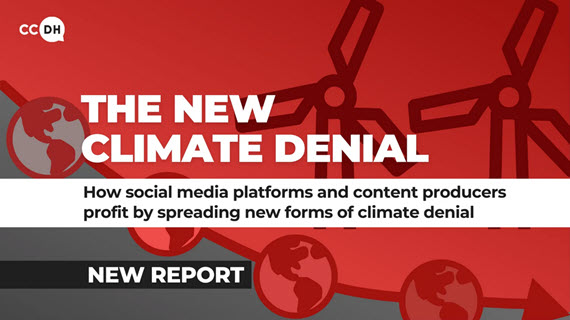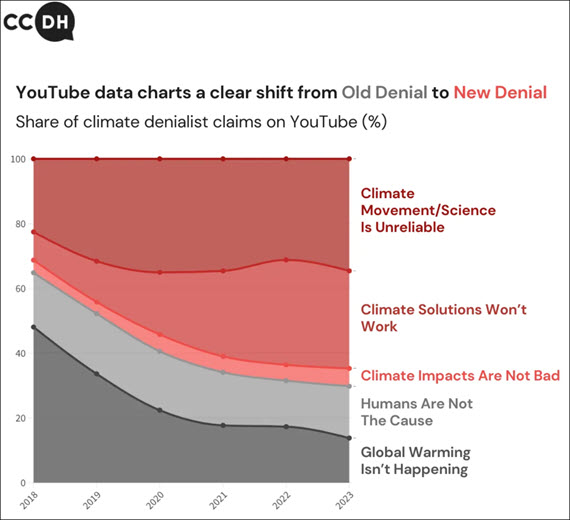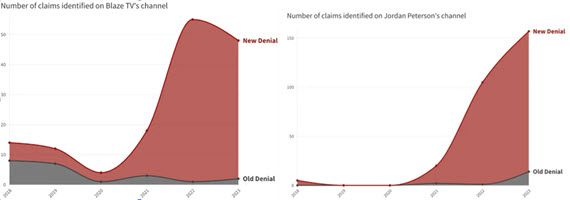CCDH Report: The New Climate Denial
Posted on 19 January 2024 by BaerbelW
On January 16, 20224, The Center for Countering Digital Hate (CCDH) published the report "The New Climate Denial". The report and underlying study centers on data analysis performed by an AI tool, CARDS, developed by academics Travis G. Coan, Constantine Boussalis, John Cook and Mirjam O. Nanko. As some of you may remember, the initial training for CARDS was conducted by members from our Skeptical Science team, so it's cool to see it put to good use now! Read CCDH's press release below followed by a selection of other articles mentioning the CCDH report, some of which include quotes by John Cook.
Key findings
- Outright denial of global warming has declined significantly, as climate deniers switch focus to undermining effectiveness of solutions, downplaying impact, and attacking climate scientists and activists
- “New Denial” narratives, championed by figures like Jordan Peterson, now comprise 70% of all climate denial on YouTube, up from just 35% in 2018
- New polling finds a third of teens believe climate policies “cause more harm than good” and 30% said “climate science and the climate movement can’t be trusted”
About the report
Climate denial on YouTube has evolved radically in recent years, a new study has found, posing a fresh challenge to those seeking public support for climate action – particularly among young people.
Researchers from the Center for Countering Digital Hate (CCDH) gathered a dataset of text transcripts from 12,058 climate-related YouTube videos posted by 96 channels over almost six years – between January 1, 2018 and September 30, 2023.
By using an AI model to analyze YouTube transcripts, the CCDH uncovered a radical shift in climate deniers’ output from “Old Denial” narratives towards what we term the “New Denial”.
“Old Denial” centered on two key false narratives, which have both declined:
- “Global warming is not happening” – which is down from 48% of all denial claims in 2018 to 14% in 2023
- “Humans are not causing global warming and climate change” – down from 17% to 16%
“New Denial” has evolved to focus on three increasingly prevalent narratives:
- “Climate solutions won’t work” – up from 9% to 30%
- “Climate science and the climate movement are unreliable” – up from 23% to 35%
- “The impacts of global warming are beneficial or harmless” – up from 4% to 6%
“New Denial” narratives – which constituted 35% of all climate denial on YouTube in 2018 – now represent the large majority (70%). In the same period, the share of “Old Denial” has dropped from 65% to just 30% of total claims.
“New Denial” narratives have been popularized by online figures such as Jordan Peterson (7.62 million subscribers), and have been championed on channels such as BlazeTV (1.92 million subscribers) and PragerU (3.21 million subscribers).
Researchers also found that YouTube ran ads for well-known brands such as Hilton Hotels and Nike on videos containing climate denial, as well as paid ads by nonprofits like the International Rescue Committee and Save the Children.
The report’s findings signal a major challenge to those seeking to build public support for climate action, the CCDH said.
A survey by the Pew Research Center, published in December 2023, found that YouTube is the most widely used social media platform among 13- to 17-year-olds. 71% of teens say they use the video-sharing platform daily, including 16% who report being on the site almost constantly.
And new polling conducted by Survation for the CCDH this month (January 2024) found:
- 31% of US 13-17 year olds agreed that “the impacts of global warming are beneficial or harmless”, including 39% of teenage boys
- 33% of all teenagers said “Climate policies cause more harm than good”, including 40% of teenage boys
- 30% said climate science and the climate movement “can’t be trusted”, including 37% of teenage boys
- 31% said climate change is “a hoax to control and oppress people”, including 41% of teenage boys
- 45% of teenage boys said “Politicians are exaggerating the urgency of climate policies”, and 44% believed climate scientists are “manipulating data”
- 34% of all teenagers said “The earth is actually entering into a new ice age”, compared to just 23% of adults (18+)

“Climate deniers now have access to vast global audiences through digital platforms. Allowing them to steadily chip away at public support for climate action – especially among younger viewers – could have devastating consequences for the future of our planet,” said Charlie Cray, Senior Strategist at Greenpeace USA.
“These platforms must take ownership of the falsehoods and mischief they propagate. The stakes are too high to be – even at this late hour – aiding and abetting polluters’ ‘new and improved’ climate disinformation narratives,” said U.S. Senator Sheldon Whitehouse.
Google’s current monetization policy on unreliable and harmful claims states that content which “contradicts authoritative scientific consensus on climate change” will not be monetized on its platforms.
But given the substantive evolution in climate denial towards “New Denial” narratives over the last six years, the CCDH calls on Google to expand its policy to also demonetize content that contradicts the authoritative scientific consensus on the “causes, impacts, and solutions” to climate change.
Without updating this policy, purveyors of “New Denial” will continue to profit from climate denial outside the narrow parameters of Google’s current policy, the Center said.
Imran Ahmed, CEO and founder of the Center for Countering Digital Hate (CCDH), said:
“Scientists have won the battle to inform the public about climate change and its causes, which is why those opposed to climate action have cynically switched focus to undermining confidence in solutions and in science itself.
“Young people spend a huge amount of time on video-sharing platforms like YouTube. These new forms of climate denial, which have proliferated rapidly over the last six years, are designed to confuse and weaken public support for climate action in the coming decades.
“It is hypocritical for social media companies to claim to be green but then monetize and amplify lies about the climate.
“It is time for digital platforms to put their money where their mouth is. They should refuse to amplify or monetize cynical climate denial content that undermines faith in our collective capacity to solve humanity’s most pressing challenge.”
U.S. Senator Sheldon Whitehouse said:
“In 2023, humankind’s hottest year, social media platforms facilitated the fossil fuel industry’s climate denial propaganda – and they did it for money. These platforms must take ownership of the falsehoods and mischief they propagate. The stakes are too high to be – even at this late hour – aiding and abetting polluters’ ‘new and improved’ climate disinformation narratives. Polluting the information atmosphere to help polluters of the physical atmosphere is a foul choice.”
Charlie Cray, Senior Strategist, Greenpeace USA, said:
“Google/YouTube need to stop enabling and profiting from the new forms of climate denial. Climate deniers now have access to vast global audiences through digital platforms. Allowing them to steadily chip away at public support for climate action – especially among younger viewers – could have devastating consequences for the future of our planet.
“Outright climate denial has become as untenable as smoking inside a hospital emergency room. But CCDH’s investigation exposes the new tactics that have metastasized in recent years: delay, deflection, and bogus attacks on solutions like offshore wind. Google/YouTube and other platforms must upgrade and enforce their policies to dial down the diseased discourse that continues to poison public consensus and obstruct the kind of clean energy transition that our planet and our communities so desperately need.”
Michael Khoo, Climate Disinformation Program Director, Friends of the Earth, said:
“Big Tech and Big Oil spread content that is stopping climate action. We’ve pressured Google to stop supporting climate denial in the past, but they’ve done little. The New Climate Denial report shows a disturbing shift in the tactics used to derail the necessary action needed to avert further disaster.
“Platforms like YouTube have billions of users and a monopoly on young people’s attention. This power shouldn’t be used to push climate denial while lining the pockets of right-wing extremists and fossil fuel companies. Social media companies must stop amplifying and profiting off the climate denial that threatens action on the most pressing crisis of human history.”
Other articles mentioning the report
NBC News - On YouTube, climate denialism takes a turn
[...] Outside researchers said the analysis mirrors trends they’ve observed in recent years.
John Cook, a senior research fellow at the Melbourne Centre for Behaviour Change at the University of Melbourne in Australia, developed the artificial intelligence model used by the Center for Countering Digital Hate.Cook’s research has focused on trends in climate contrarian blogs and conservative think tank websites from 1998 to 2020.
The research, which was published in the peer-reviewed journal Scientific Reports, found a similar trend.
“It’s clear that the future of climate misinformation will be more and more focused on solutions and attacking climate science itself,” Cook said in an email. “Misinformation targeting solutions is designed to delay climate action, while misinformation attacking climate science erodes public trust in climate science and scientists.” [...]
Grist - How YouTube’s climate deniers turned into climate doomers
[...] John Cook, a researcher at the Melbourne Centre for Behaviour Change in Australia, has documented a similar rise in attacks on climate solutions by conservative think tanks and blogs. “It’s surprising to see misinformation on YouTube shifting so quickly,” Cook said in an email. “The future of climate misinformation will be focused on attacking climate solutions, and we need to better understand those arguments and how to counter them.” [...]
CNET - Climate Denial on YouTube Is Evolving. Here's How to Make Sense of It
[...] Scientists have proven these narratives false, and the use of them as denial narratives is, thankfully, increasingly rare. In its report, the CCDH quotes climate skeptiscm researcher John Cook as saying this is because "science denial has become untenable" in light of people experiencing climate impacts for themselves. [...]
Reuters - YouTube making money off new breed of climate denial, monitoring group says
The Guardian - Third of UK teenagers believe climate change exaggerated, report shows
The Independent - Climate misinformation is mutating on YouTube – and the platform is profiting
Newsweek - 'Bad Guys' Are Duping Teens on Climate Change: Expert
Ars Technica - Climate denialists find new ways to monetize disinformation on YouTube































 Arguments
Arguments

































Learning climate science and the science of climate change and the science of how and why burning fossil fuels at the scale that the world is now engaged is a BFD*, has been for me inextricably linked to learning about disinformation.
Disinformation is a phenomenon that also can be understood as a subject of disciplined scientific enquiry. If I get into a friendly sincere discussion with family members, friends, acquaintences or strangers I like to enquire as politely as I can manage about what sources they use to gather information (or DISinformation!) about the world.
* BFD is an acronym that I learned from the very calm, mild mannered climate scientist, Jim Hansen. It means Big #@$!%^& Deal.
John@1, I would like to echo your tactic of asking people for their sources. I also find this an effective tactic. Some get agitated when asked for their sources, because they realize that they themselves don't really know.
John McKeon and Evan,
As and engineer with an MBA I have learned to be on 'high alert' for potential marketing disinformation by people wanting to manipulate me into 'using their products or services'.
The following follow-up questions should be asked after asking for a persons ‘information source’: